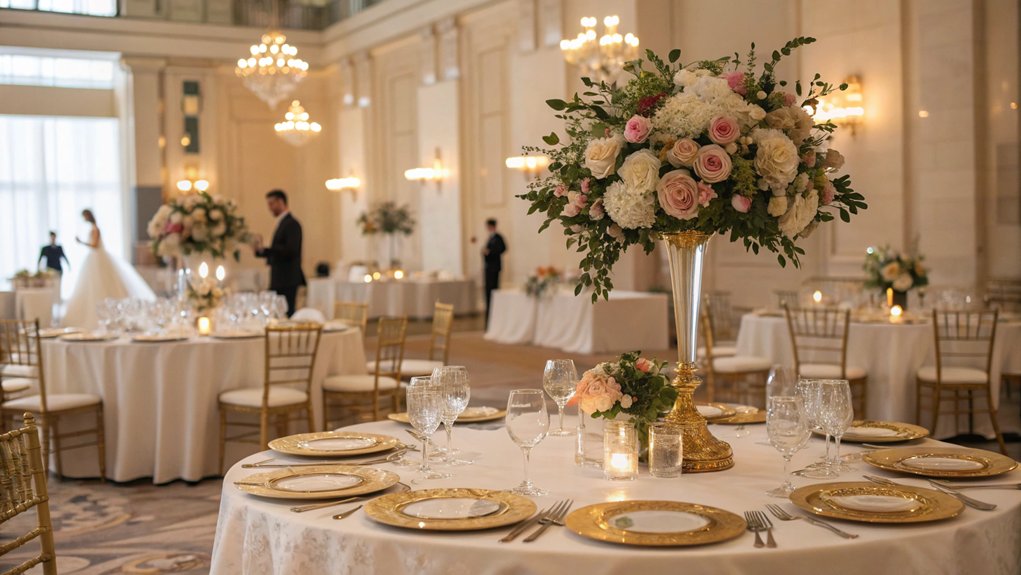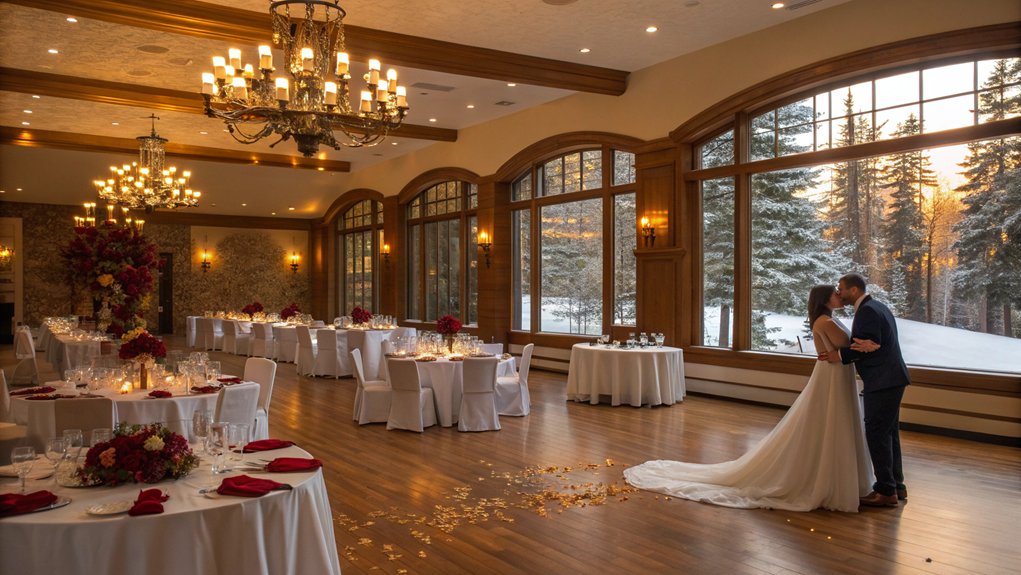What Is the Average Cost of a Wedding in Canada in 2025?
Wedding costs in Canada skyrocket to $36,000 in 2025, but savvy couples in Calgary spend $15,000 less than Toronto. Regional secrets matter.
The average wedding cost in Canada for 2025 is estimated between $30,000 and $40,000, with the national average reaching approximately $36,000, representing an increase from $33,000 in 2024. Regional variations profoundly impact expenses, as Toronto weddings often exceed $45,000 due to premium venue costs, while Calgary celebrations average $25,000 to $30,000. Strategic planning and understanding specific expense categories can help couples manage these rising costs more effectively.

When planning one of life’s most momentous celebrations, Canadian couples increasingly find themselves traversing a complex landscape of escalating wedding costs that demand meticulous financial preparation and strategic decision-making. The average wedding cost in Canada for 2025 is estimated between $30,000 and $40,000, with the national average reaching approximately $36,000, representing a notable increase from $33,000 in 2024 and $29,000 in 2023.
Regional variations dramatically impact wedding expenses across the country, with Toronto weddings often reaching $45,000 or more due to premium venue costs and higher service fees in urban centers. Calgary presents a more affordable alternative, averaging $25,000 to $30,000, while maintaining quality options for couples seeking cost-effective festivities. These geographic differences reflect varying venue availability, meal options, and service provider pricing structures throughout different provinces.
The venue represents the largest single expense category, typically consuming 30-40% of the total wedding budget, while meal costs average $100-$120 per person nationally. Photography and videography services combined average approximately $5,500, with individual photographers and videographers charging $2,500-$3,000 each in major urban markets like Toronto. Wedding attire expenses typically reach around $5,000 for dress, suit, and accessories, while decorations and flowers average approximately $4,500 in metropolitan areas.
Cost-saving tactics prove essential for budget-conscious couples, with off-peak dates such as weekdays or winter months offering substantial savings opportunities. Limiting guest lists directly reduces expenses proportionally, while non-traditional or smaller venues can dramatically decrease venue and meal fees. Package deals combining multiple services often provide discounts on venue, meal, or photography arrangements.
Financial experts recommend planning budgets around $100 per guest for adequate coverage of typical wedding expenses, while maintaining a contingency fund of 5-10% helps manage unexpected costs without budget overruns. Essential expenses like officiant fees averaging $300 and marriage license costs of $150 should be budgeted separately from primary celebration expenses. Much like understanding closing costs when purchasing a home, couples should prepare for additional expenses beyond the major categories that can range from 2-5% of their total wedding budget. Making specific choices about vendors, menu options, and services remains crucial since exact costs are difficult to pinpoint without these detailed decisions.
Nearly half of Canadian couples exceed their initial budgets, influenced by rising prices, inflation, and social expectations, making meticulous planning and realistic budget allocation crucial for successful wedding financial management. However, many couples discover that the most meaningful and emotional celebrations often cost significantly less than these averages, proving that authentic connections matter more than extravagant spending.
Frequently Asked Questions
How Can Couples Save Money on Their Wedding Without Sacrificing Quality?
Couples can achieve significant savings through strategic guest list reduction to under 50 attendees, selecting off-peak weekday or winter dates for 10-30% vendor discounts, and prioritizing all-inclusive venue packages that bundle culinary and decor services.
Implementing thoughtful DIY elements like digital invitations, seasonal flowers, and curated playlists, while choosing rental attire over custom designs, maintains quality while substantially reducing overall wedding expenses.
What Percentage of Income Should Couples Allocate Toward Their Wedding Budget?
Financial advisors typically recommend couples allocate 5% to 10% of their combined annual income toward wedding expenses, with a reasonable range extending to 15% depending on individual circumstances.
Higher-income couples often spend smaller percentages but larger absolute amounts, while younger couples should lean toward the lower end to avoid debt and maintain financial wellness for future goals.
Are Destination Weddings in Canada Cheaper Than Traditional Local Ceremonies?
Destination weddings in Canada aren’t consistently cheaper than traditional local ceremonies, as important factors like location choice, guest count, and travel logistics heavily influence costs.
While smaller guest lists and all-inclusive packages can reduce expenses, transportation and accommodation costs often offset savings. Remote destinations typically offer better value than popular tourist areas, making thoughtful venue selection essential for budget-conscious couples.
How Much Should Couples Tip Wedding Vendors and Service Providers?
Couples should allocate 10-20% of their total vendor fees for gratuities, with catering personnel receiving 15-20% of food costs, photographers earning $50-$200, and wedding planners getting 10-20% of their fee.
Hair stylists, officiants, and musicians typically receive $20-$100 depending on service complexity, while delivery staff and assistants earn $10-$40 each for quality performance.
What Hidden Wedding Costs Do Couples Often Forget to Budget For?
Couples frequently overlook marriage license fees averaging $150, wedding planner costs ranging $2,000-$7,000, and videography expenses adding approximately $5,500.
Hidden charges include HST on culinary expenses, overtime vendor fees, rental damage costs, and last-minute floral upgrades totaling $1,000-$2,500.
Administrative expenses for document changes, transportation costs for legal appointments, gratuities beyond planned amounts, and contingency funds of 5-10% often escape initial budgeting considerations.
What’s next?
The information provided is based on current laws, regulations and other rules applicable to Canadian residents. It is accurate to the best of our knowledge as of the date of publication. Rules and their interpretation may change, affecting the accuracy of the information. The information provided is general in nature, and should not be relied upon as a substitute for advice in any specific situation. For specific situations, advice should be obtained from the appropriate legal, accounting, tax or other professional advisors. Full details of coverage, including limitations and exclusions that apply, are set out in the certificate of insurance provided on enrollment.
This article is meant to provide general information only. It’s not professional medical advice, or a substitute for that advice.
Saphira Financial Group does not provide legal, accounting, taxation, or other professional advice. Please seek advice from a qualified professional, including a thorough examination of your specific legal, accounting and tax situation.







